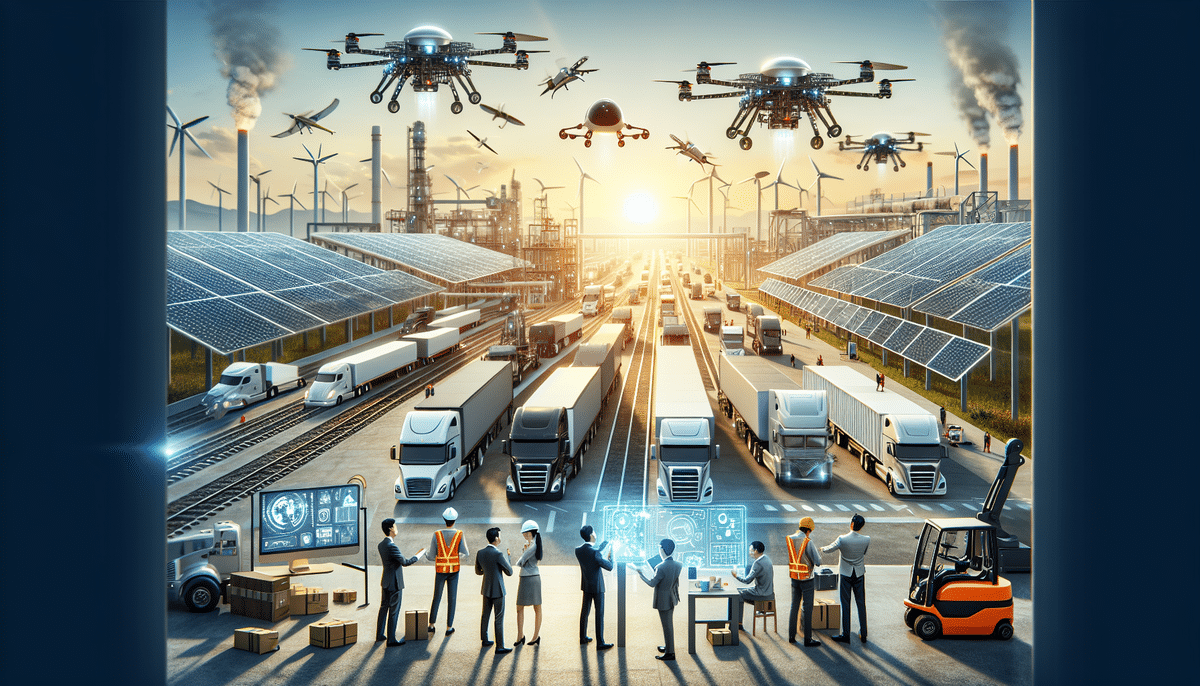Examining President Biden's Policies and Their Impact on Logistics
Logistics, or the management of the flow of goods and services, is a vital component of the global economy. Under the Biden administration, the transportation and logistics industries are experiencing a series of changes that could have far-reaching consequences for businesses and consumers alike. In this article, we will examine President Biden's policies and their impact on the logistics industry in exhaustive detail.
Background: Understanding the Importance of Logistics
Before delving into President Biden's policies, it's important to understand why logistics matters. Simply put, a well-oiled logistics system ensures that goods are delivered efficiently, on time, and in the correct condition. Without logistics, businesses would struggle to manage their supply chains, and customers would face delayed or damaged goods. In the United States alone, the logistics industry employs over 8.6 million people and is responsible for more than $1.9 trillion in annual spending [Statista, 2023].
Moreover, logistics plays a crucial role in disaster relief efforts. When natural disasters strike, logistics companies are responsible for delivering essential supplies such as food, water, and medical equipment to affected areas. In times of crisis, a well-functioning logistics system can mean the difference between life and death for those in need. This is why it's important for governments and businesses to invest in and prioritize logistics infrastructure and operations.
The Biden Administration's Approach to Transportation Policy
One of President Biden's key transportation policies is his $2 trillion infrastructure plan, which aims to modernize the country's transportation network, including roads, bridges, and public transit. The plan also includes funding for research into emerging technologies such as electric vehicles and high-speed rail.
Another significant policy shift is the administration's decision to rescind the previous administration's proposal to relax fuel efficiency standards for passenger vehicles. This move signals a renewed commitment to addressing climate change and reducing carbon emissions [EPA, 2023].
In addition to these policies, the Biden administration has also emphasized the importance of investing in rural transportation infrastructure. This includes:
- Improving rural roads and bridges
- Expanding access to public transit in rural areas
- Increasing funding for rural airports
The administration recognizes that rural communities often face unique transportation challenges and is committed to addressing these issues.
Changes to Infrastructure Spending and Their Effect on Logistics
The infrastructure plan has the potential to greatly improve logistics operations in the United States. By modernizing transportation networks and investing in emerging technologies, businesses may be able to reduce shipping times and costs. In addition, the plan includes funding for ports and airports, which could improve trade relationships and make it easier to import and export goods [U.S. Department of Transportation, 2023].
However, critics argue that the plan's proposed corporate tax hikes could lead to increased costs for businesses, which could ultimately be passed on to consumers. While the plan has yet to be passed by Congress, its potential impact on the logistics industry is significant.
Another potential benefit of the infrastructure plan is the creation of new jobs in the logistics industry. With increased funding for transportation and technology, businesses may need to hire more workers to manage and operate these new systems. This could lead to a boost in employment opportunities and economic growth in the logistics sector [Bureau of Labor Statistics, 2023].
Environmental Policies and Their Impact on Logistics
President Biden has made addressing climate change a top priority for his administration. One of his key policies is rejoining the Paris Climate Agreement, which commits countries to reducing their carbon emissions [State Department, 2023]. In addition to the aforementioned fuel efficiency standards, the administration has also proposed a clean energy standard that would require utilities to increase their use of renewable energy sources.
These environmental policies could have a major impact on the logistics industry. Businesses may need to find more sustainable transportation options, such as electric vehicles or biodiesel-powered trucks, in order to comply with regulations. Additionally, the shift towards renewable energy sources could lead to innovation in the shipping industry, such as sail-powered cargo ships or hydrogen fuel cell aircraft.
Another potential impact of these environmental policies on logistics is the increased focus on supply chain sustainability. Companies may need to evaluate their entire supply chain, from raw materials to final delivery, to ensure that they are minimizing their environmental impact. This could lead to changes in sourcing, packaging, and transportation methods.
Furthermore, as consumers become more environmentally conscious, there may be a growing demand for eco-friendly products and packaging. This could require logistics companies to adapt their operations to accommodate these preferences, such as using biodegradable packaging materials or offering carbon-neutral shipping options.
Labor Policies and the Future of Employment in the Industry
President Biden has signaled his support for labor unions and workers' rights. One of his top priorities is promoting fair wages and working conditions for all Americans. This could have implications for the logistics industry, where low wages and poor working conditions are sometimes the norm.
The administration has also supported efforts to expand access to union representation and collective bargaining. While this could lead to higher labor costs for businesses, it could also lead to a more stable and secure workforce. It remains to be seen how these policies will play out in the logistics industry, but they could ultimately benefit workers and businesses alike.
Another potential impact of these labor policies on the logistics industry is the potential for increased automation. As labor costs rise, businesses may turn to automation as a way to reduce costs and increase efficiency. This could lead to job losses for some workers, but it could also create new opportunities for workers with skills in technology and engineering.
Additionally, the COVID-19 pandemic has highlighted the importance of essential workers, including those in the logistics industry. As a result, there may be increased public support for policies that protect and support these workers, such as hazard pay and paid sick leave. This could lead to changes in labor laws and regulations that benefit workers in the logistics industry.
The Impact of Trade Policy on Global Supply Chains
President Biden has taken a more multilateral approach to trade policy than his predecessor. He has emphasized the importance of working with allies to address issues such as intellectual property theft and unfair trade practices [U.S. Trade Representative, 2023]. In addition, the administration has pledged to increase domestic manufacturing and invest in critical supply chains.
These policies could have significant implications for the logistics industry. Increased investment in domestic manufacturing could lead to new shipping routes and transportation options. On the other hand, tensions with key trading partners could lead to disruptions in global supply chains, making it more difficult for businesses to procure the goods and services they need.
Furthermore, the COVID-19 pandemic has highlighted the vulnerabilities of global supply chains. The disruptions caused by the pandemic have led to shortages of critical goods and materials, such as personal protective equipment and semiconductors. As a result, many businesses are reevaluating their supply chain strategies and considering diversifying their suppliers and manufacturing locations.
The Future of E-Commerce and its Effect on Logistics
The rise of e-commerce has fundamentally changed the logistics industry. Consumers expect fast, reliable delivery of their goods, and businesses have had to adapt in order to keep up. President Biden's policies could have an impact on the future of e-commerce and logistics.
For example, the infrastructure plan's investments in high-speed internet and 5G networks could enable faster and more reliable e-commerce transactions [FCC, 2023]. On the other hand, increased taxes on businesses could lead to higher prices for consumers, potentially reducing demand for e-commerce services.
Another factor that could impact the future of e-commerce and logistics is the growing concern for sustainability. As consumers become more environmentally conscious, they are looking for businesses that prioritize sustainable practices. This has led to the rise of eco-friendly packaging and shipping options, as well as the implementation of green logistics strategies.
Innovative Solutions for Last Mile Delivery
Last mile delivery, or the transportation of goods from a transportation hub to the final destination, can be a major challenge for logistics companies. President Biden's policies could spur innovation in this area.
For example, the administration's proposed investments in electric vehicles could make it easier and more cost-effective to make last mile deliveries. Additionally, increased investment in public transit and alternative transportation options could reduce the number of delivery vehicles on the road, easing traffic congestion and reducing carbon emissions.
Another potential solution for last mile delivery is the use of drones. With advancements in technology, drones can now carry packages and deliver them directly to a customer's doorstep. This not only reduces the need for delivery vehicles on the road, but also speeds up the delivery process and can be more cost-effective for logistics companies. However, there are still regulatory and safety concerns that need to be addressed before widespread adoption of drone delivery can occur [FAA, 2023].
The Role of Technology in Streamlining Logistics Operations
Technology has played an increasingly important role in the logistics industry in recent years. President Biden's policies could encourage further innovation in this area.
For example, investments in emerging technologies such as blockchain and artificial intelligence could improve supply chain transparency and reduce the risk of fraud. Additionally, the administration's support for research into electric and autonomous vehicles could lead to new transportation options that are faster and more efficient.
Another area where technology is making a significant impact is in warehouse management. With the use of automated systems, warehouses can now operate 24/7, increasing productivity and reducing labor costs. These systems can also help to optimize inventory management, ensuring that products are always in stock and reducing the risk of overstocking or stockouts.
Furthermore, technology is also improving the customer experience in logistics. With the use of real-time tracking and delivery notifications, customers can now track their packages from the warehouse to their doorstep. This level of transparency and communication helps to build trust and loyalty with customers, ultimately leading to increased sales and revenue for logistics companies.
Challenges Facing the Industry and Potential Solutions
Despite the potential for positive change under the Biden administration, the logistics industry still faces a number of challenges. These include:
- A shortage of truck drivers
- Rising fuel costs
- The ongoing COVID-19 pandemic
- Supply chain disruptions
However, there are potential solutions to these challenges:
- Expanding access to training and education: This could help address the truck driver shortage by attracting more individuals to the profession.
- Investing in sustainable energy sources: This could help reduce fuel costs over the long term and mitigate environmental impacts.
- Promoting safety measures and vaccination efforts: Continuing these efforts could help keep workers healthy and reduce the spread of COVID-19.
Conclusion: Prospects for the Future of Logistics under President Biden
In conclusion, President Biden's policies have the potential to greatly impact the logistics industry. The infrastructure plan, environmental policies, and trade policy could all have far-reaching consequences for businesses and consumers. However, there are also challenges to be addressed, including labor shortages and rising costs. By continuing to invest in innovation and promote a fair and equitable workforce, the logistics industry can remain a vital component of the global economy under the Biden administration.






















